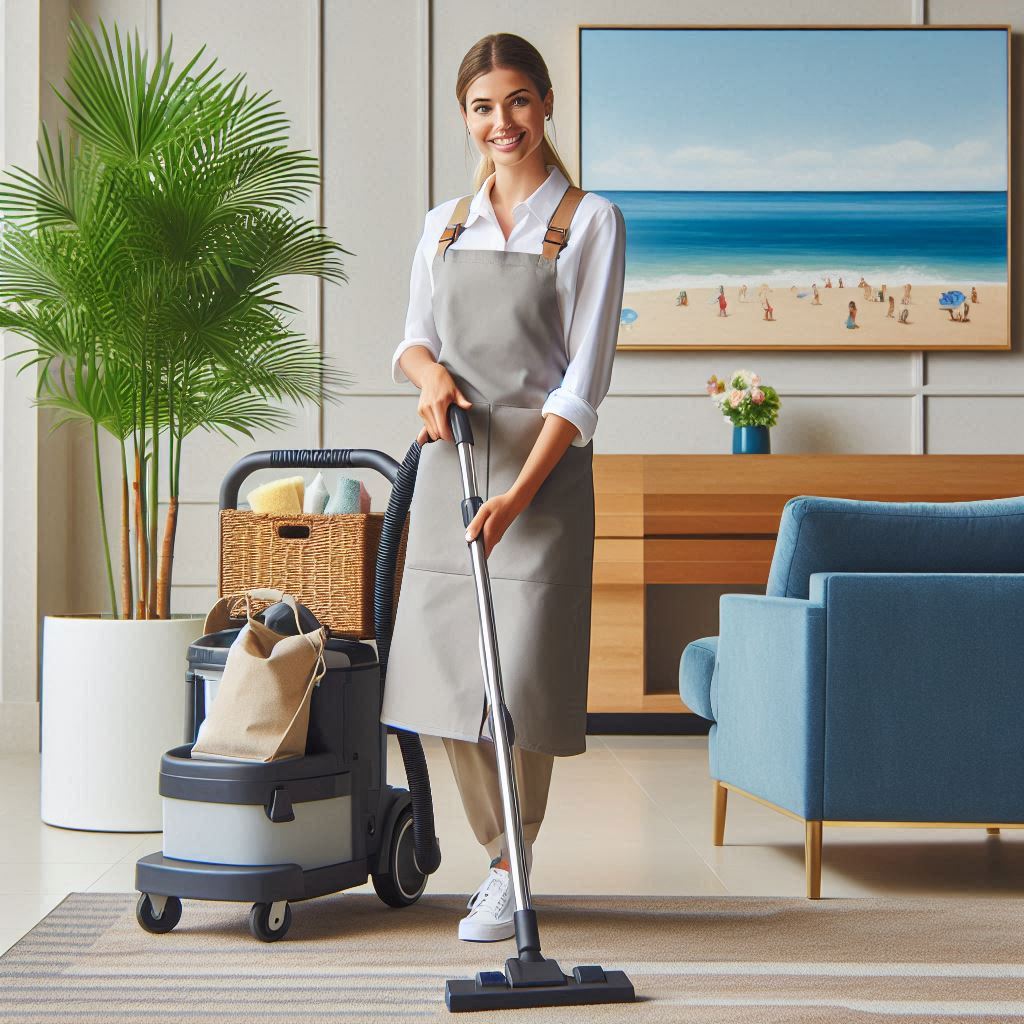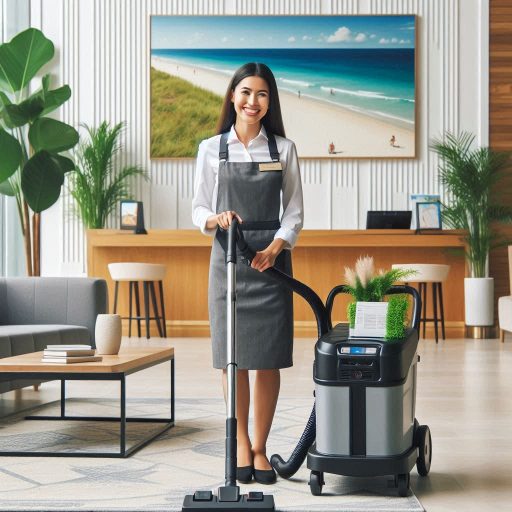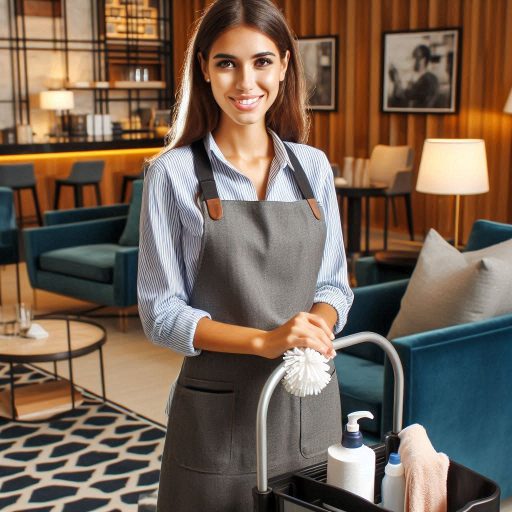Introduction
Conducting a successful housekeeper interview is crucial for maintaining a clean and organized living environment.
The right housekeeper does more than just perform cleaning tasks; they help create a welcoming atmosphere and contribute to your overall peace of mind.
A skilled housekeeper ensures that your home remains spotless and manages various responsibilities, such as laundry, dishwashing, and other household chores.
Finding the right candidate is essential for establishing trust and ensuring that your needs are met consistently.
An effective interview can help you assess candidates’ experience, skills, and personality, ensuring they fit well with your household dynamics.
By understanding their background and approach to work, you can make informed decisions that positively impact your home life.
A well-conducted interview not only clarifies expectations but also sets the tone for a successful working relationship.
In this blog post, we will explore essential tips for conducting effective housekeeper interviews.
We will discuss key questions to ask that reveal important insights about each candidate’s capabilities.
Additionally, we will outline the qualities to look for in candidates, such as attention to detail, reliability, and communication skills.
Furthermore, we will delve into creating a comfortable interviewing environment, which can encourage candidates to express themselves openly.
What to Look for in a Housekeeper
When hiring a housekeeper, prioritize specific qualities that ensure quality service.
Qualities Such as Reliability, Attention to Detail, and Communication Skills
Reliability is a critical quality.
Reliable candidates consistently show up on time and complete tasks efficiently.
Look for individuals who take pride in their work and demonstrate a strong work ethic.
This quality is essential for maintaining a clean and organized home.
Attention to detail is another crucial quality.
A good housekeeper notices the little things, such as dust in corners or streaks on mirrors.
They should follow your cleaning preferences and routines.
This skill ensures every area of your home receives the care it deserves.
Communication skills are vital for a successful working relationship.
A housekeeper needs to understand your expectations clearly.
They should feel comfortable asking questions or seeking clarification on tasks.
Effective communication fosters collaboration and ensures both parties are on the same page.
Specific Questions to Ask to Gauge These Qualities During the Interview
During the interview, ask specific questions to gauge these qualities.
Start with questions that reveal their reliability.
For instance, ask, ‘Can you describe your previous work schedule?‘ This question provides insight into their commitment and punctuality.
Inquire about their approach to cleaning tasks.
You might ask, ‘How do you prioritize your cleaning duties?‘ This question assesses their attention to detail and organizational skills.
A strong candidate will have a clear strategy for tackling different tasks based on urgency and importance.
To evaluate communication skills, ask situational questions.
Pose a scenario: ‘What would you do if you encountered a problem while cleaning?‘ Their response will show how they handle challenges and seek assistance.
Look for candidates who emphasize the importance of open dialogue in their answer.
Another valuable question to ask is, ‘How do you handle feedback from your employer?‘ A good housekeeper should welcome constructive criticism and demonstrate a willingness to improve.
This quality indicates they are committed to meeting your standards.
You can also inquire about their experience with specific cleaning products or techniques.
Ask, ‘What cleaning products do you prefer and why?‘ Their knowledge will reveal their attention to detail and familiarity with effective cleaning methods.
A well-informed housekeeper can provide better results.
Look for reliability, attention to detail, and strong communication skills in a housekeeper.
These qualities contribute to a positive and productive working relationship.
By asking targeted questions during the interview, you can gain insight into each candidate‘s suitability.
Choose someone who aligns with your expectations and values to ensure a clean and comfortable home.
Questions to Ask During the Interview
When interviewing a potential housekeeper, asking the right questions is crucial.
This process helps you assess their qualifications and compatibility with your needs.
Focus on questions about their previous experience, cleaning methods, and availability.
Specific Questions to Ask About Previous Experience, Cleaning Methods, and Availability
First, ask about their previous experience in house cleaning.
Inquire, “How long have you worked as a housekeeper?” This question provides insight into their level of experience.
A seasoned housekeeper typically demonstrates greater efficiency and skill.
Next, ask, “What types of cleaning jobs have you handled in the past?” This question allows candidates to share relevant experiences.
Their answer reveals if they can handle the specific tasks you require.
Inquire about their familiarity with different cleaning products and equipment.
Ask, “Which cleaning products do you prefer to use and why?” Understanding their preferences can indicate their knowledge of effective cleaning methods.
A knowledgeable housekeeper uses appropriate products for various surfaces.
Additionally, ask about their cleaning methods.
For example, you can ask, “Can you describe your typical cleaning routine?” This question helps you gauge their thoroughness and attention to detail.
A systematic approach ensures that no area is overlooked.
Availability is another crucial factor.
Ask, “What is your availability for work?” This question clarifies if the candidate’s schedule aligns with your needs.
Knowing their availability helps you determine if they can meet your requirements.
You should also explore their approach to handling special requests.
Ask, “How do you handle special cleaning requests or tasks?” This question assesses their flexibility and willingness to adapt.
A good housekeeper is open to accommodating your specific needs.
Furthermore, inquire about their ability to work independently.
Ask, “How do you prioritize tasks when working without supervision?” This question provides insight into their organizational skills.
A capable housekeeper should efficiently manage their time and responsibilities.
Safety is paramount in housekeeping.
Therefore, ask, “What safety precautions do you take while cleaning?” This question helps you understand their commitment to maintaining a safe environment.
A responsible housekeeper follows safety protocols to protect themselves and your home.
Lastly, consider asking about references.
Ask, “Can you provide references from previous clients or employers?” This question allows you to verify their credibility and work ethic.
Positive references can give you confidence in their abilities.
Read: How to Handle Emergency Situations in Pet Grooming
Why Each Question Is Important in Evaluating a Potential Housekeeper
By asking these specific questions, you can evaluate a potential housekeeper effectively.
Each question serves a purpose, helping you gain insights into their experience, methods, and compatibility with your needs.
Understanding their previous experience helps you assess their suitability for the job.
Knowledge of cleaning products indicates their capability in maintaining your home effectively.
Questions about availability ensure their schedule aligns with yours, avoiding conflicts.
Asking about safety precautions confirms their commitment to a safe environment.
References provide assurance of their reliability and professionalism.
Take the time to conduct a thorough interview, ensuring you find the right fit for your home.
How to Assess Problem-Solving Skills
The Importance of Evaluating a Housekeeper’s Ability to Handle Unexpected Situations
Evaluating a housekeeper’s problem-solving skills is crucial for several reasons.
Housekeepers frequently face unexpected situations that require quick and effective responses.
Challenges can include stains on carpets, broken equipment, or scheduling conflicts.
A housekeeper with strong problem-solving abilities can address these challenges efficiently, ensuring smooth operations.
This capability helps maintain a high standard of cleanliness and enhances guest satisfaction.
In the hospitality industry, the ability to think on their feet sets excellent housekeepers apart from the rest.
Questions That Can Help Determine Problem-Solving Skills During the Interview
During interviews, ask targeted questions to assess problem-solving skills.
Open-ended questions encourage candidates to share their experiences.
For example, consider asking, “Can you describe a time when you faced a challenging situation at work?” This question allows candidates to demonstrate their critical thinking abilities.
Another effective question is, “What would you do if you discovered a large stain on a carpet just before a guest’s arrival?” This question tests their ability to think quickly and devise a solution under pressure.
Look for answers that showcase resourcefulness and creativity in problem-solving.
A candidate might mention using specific cleaning products or employing a technique they’ve learned.
You can also ask about a time when a guest requested something unusual.
For instance, “How would you handle a situation where a guest requests an extra service on short notice?” This question assesses their ability to adapt to changing circumstances.
Candidates should demonstrate flexibility and a willingness to go the extra mile to meet guest needs.
It’s important to evaluate candidates’ responses critically.
Pay attention to how they articulate their thought processes.
Candidates who can clearly explain their steps show strong analytical skills.
Ask follow-up questions for more detail.
For instance, inquire, “What was the outcome of your actions?” This helps you understand the effectiveness of their problem-solving approach.
Consider scenarios that may not have clear solutions.
For example, “How would you approach a situation where a colleague is not meeting expectations?” This question evaluates interpersonal skills along with problem-solving abilities.
It reveals how candidates handle conflicts and collaborate with others.
In addition to questions, observe the candidate’s demeanor.
Confidence in their responses can indicate strong problem-solving skills.
Body language and eye contact are also important.
A candidate who engages positively demonstrates their ability to handle stress.
Ultimately, these assessments will help you choose the right housekeeper for your team.
A candidate with strong problem-solving skills can make a significant difference in your establishment.
Read: How Much Do Pet Groomers Earn in the USA?
Expectations and Boundaries
The Importance of Setting Clear Expectations and Boundaries from the Start
Setting clear expectations and boundaries is essential when hiring a housekeeper.
Doing so ensures that both the employer and the housekeeper understand their roles and responsibilities.
Clear communication from the start helps prevent misunderstandings and conflicts down the line.
It creates a foundation of trust, allowing both parties to work effectively together.
When expectations are well-defined, housekeepers can perform their duties with confidence, knowing exactly what is required of them.
Establishing boundaries also helps maintain a professional relationship, ensuring that personal space and privacy are respected.
Examples of Questions to Ask About Specific Tasks, Schedules, and Communication Preferences
To ensure clarity, ask specific questions during the interview about tasks, schedules, and communication preferences.
Start with task-related inquiries.
For example, ask, ‘What cleaning tasks do you prioritize on a daily basis?‘ This question allows candidates to outline their approach to cleaning and organization.
You might also ask, ‘How do you handle deep cleaning tasks, and how often do you think they should be done?‘ This helps clarify their understanding of cleanliness standards and expectations.
Next, address scheduling by asking, ‘What is your availability for work? Are there specific days or times you prefer?‘ Understanding a candidate‘s schedule ensures that it aligns with your needs.
Additionally, you can ask, ‘How do you handle last-minute changes to your schedule?‘ This question assesses their flexibility and willingness to adapt.
Communication preferences are also important.
Ask candidates, ‘What is your preferred method of communication for work-related issues?‘ This question can reveal whether they prefer texting, email, or face-to-face discussions.
You might also inquire, ‘How do you like to receive feedback on your work?‘ This shows your commitment to open communication and helps establish a supportive working environment.
Another key question to ask is, ‘What do you expect from me as an employer?‘ This question encourages candidates to express their needs, fostering an open dialogue about mutual expectations.
Additionally, ask, ‘How do you handle conflicts or misunderstandings with supervisors or team members?‘ This helps you gauge their problem-solving skills and how they navigate professional relationships.
Lastly, emphasize the importance of mutual respect.
Make it clear that you value their input and want to create a positive working environment.
Establishing these expectations during the interview lays the groundwork for a successful working relationship.
By clearly discussing expectations and boundaries, you can ensure that both you and your housekeeper are on the same page.
This proactive approach promotes a harmonious and productive working environment, benefiting everyone involved.
Read: Top Pet Grooming Conferences and Expos in the USA

Work Ethic and Professionalism
The Significance of Assessing a Housekeeper’s Work Ethic and Professionalism
Assessing a housekeeper’s work ethic and professionalism is crucial for several reasons.
A strong work ethic ensures that tasks are completed efficiently and to a high standard.
Professionalism fosters a positive atmosphere, contributing to overall team morale and client satisfaction.
Housekeepers often interact with clients directly, making their demeanor and attitude essential.
A professional housekeeper represents your establishment and sets the tone for guest experiences.
Therefore, evaluating these traits during the interview process can help you select a candidate who aligns with your values and expectations.
Guidance on Asking Questions to Gauge Punctuality, Work Habits, and Attitude Towards Clients
To effectively gauge a housekeeper’s work ethic and professionalism, consider asking specific questions related to punctuality, work habits, and their attitude towards clients.
Start with questions about punctuality.
For example, ask, ‘How do you ensure you arrive on time for your shifts?‘ This question allows candidates to discuss their strategies for managing time and commitments.
You might also inquire, ‘What do you do if you anticipate being late?‘ This helps you understand their accountability and proactive problem-solving skills.
Next, focus on work habits.
Ask questions like, ‘Can you describe your daily cleaning routine?‘ This question gives insight into their organizational skills and attention to detail.
Another good question is, ‘How do you prioritize tasks when you have multiple assignments?‘ This reveals their ability to manage time and workload effectively.
You could also ask, ‘What steps do you take to ensure quality in your work?‘ This emphasizes their commitment to maintaining high standards.
When it comes to their attitude towards clients, consider asking, ‘How do you handle difficult or demanding clients?‘ This question helps assess their customer service skills and professionalism in challenging situations.
You might also ask, ‘Can you provide an example of a time you went above and beyond for a client?‘ This allows candidates to showcase their dedication and willingness to exceed expectations.
Additionally, inquire about their approach to feedback by asking, ‘How do you respond to constructive criticism?‘ This question assesses their attitude toward improvement and professionalism in the workplace.
A strong candidate will express openness to feedback and demonstrate a desire to enhance their skills.
Lastly, reinforce the importance of professionalism in your workplace.
Make it clear that you value respect, accountability, and a positive attitude.
By discussing these traits and asking the right questions, you can effectively evaluate a candidate’s work ethic and professionalism.
By focusing on these areas during the interview, you can identify a housekeeper who will contribute positively to your team.
A candidate with a strong work ethic and professionalism will not only perform their duties well but also enhance the overall environment of your establishment.
Read: Educational Requirements for Childcare Workers Explained
Tips for a Successful Interview Process
Suggestions for Creating a Comfortable and Professional Interview Environment
Creating a comfortable and professional interview environment is essential for a successful interview process.
A positive atmosphere helps candidates feel at ease, encouraging open and honest communication.
Start by choosing a quiet, well-lit space free from distractions.
This setting allows both you and the candidate to focus on the discussion without interruptions.
Arrange seating in a way that promotes conversation.
Opt for comfortable chairs positioned at a respectful distance, fostering a sense of equality.
Consider offering a beverage, such as water or coffee, to create a welcoming ambiance.
These small gestures can help candidates relax and engage more fully.
Before the interview begins, take a moment to introduce yourself and explain the interview process.
This transparency helps set the tone for a professional interaction.
Ensure that you maintain a friendly demeanor throughout the interview, as this will encourage the candidate to express themselves openly.
Additionally, ensure that the timing of the interview is convenient for both parties.
Arranging interviews during regular working hours can reduce stress and allow candidates to arrive in a calm state of mind.
Respecting their time and schedules demonstrates professionalism and consideration.
Advice on Active Listening, Taking Notes, and Following Up After the Interview
Active listening is a critical skill during the interview process.
Focus fully on the candidate‘s responses without interrupting.
Show engagement by nodding, maintaining eye contact, and using verbal affirmations like ‘I see‘ or ‘That‘s interesting.
‘ These cues encourage candidates to elaborate on their answers, providing you with valuable insights.
Taking notes is equally important.
Jot down key points from the candidate’s responses to help you remember details later.
Note any strengths, weaknesses, or standout qualities that may influence your decision-making process.
Be discreet when writing, as excessive note-taking can distract from the conversation.
Strike a balance between listening and recording information to maintain rapport.
After the interview, make it a priority to follow up with candidates.
Send a thank-you email or message expressing appreciation for their time and interest in the position.
This gesture reflects positively on your organization and reinforces the professional atmosphere you‘ve established.
If applicable, provide an estimated timeline for when candidates can expect to hear back from you regarding the next steps.
In your follow-up communication, you might also include a brief summary of the interview highlights or next steps.
This transparency keeps candidates informed and engaged in the process.
By implementing these tips, you can enhance the effectiveness of your interview process.
Creating a comfortable environment and practicing active listening will foster meaningful conversations.
Taking notes and following up will help maintain professionalism and keep candidates informed.
Ultimately, these practices will contribute to finding the best fit for your housekeeping team.
Gain More Insights: Common Misconceptions About Travel Agents
Transform Your Career Today
Unlock a personalized career strategy that drives real results. Get tailored advice and a roadmap designed just for you.
Start NowGain More Insights: How to Become a Front Desk Agent: A Step-by-Step Guide
Conclusion
Conducting effective housekeeper interviews requires thorough preparation and attention to detail.
Start by focusing on essential questions that reveal candidates’ experience and skills.
Inquire about their previous cleaning roles to understand their familiarity with various tasks.
Ask about their preferred cleaning techniques and how they handle specific challenges.
Prioritize inquiries about time management and reliability, as these traits are crucial for success.
Evaluate candidates’ interpersonal skills since strong communication fosters better teamwork.
Remember to create a comfortable environment during interviews to encourage open dialogue and honesty.
Utilize behavioral questions to gain insights into how candidates handle challenging situations.
For example, ask how they would address a difficult client or manage a tight deadline.
Taking notes during interviews can help you compare candidates later and make informed decisions.
Finally, trust your instincts when making a hiring choice.
By applying these tips, you can conduct successful housekeeper interviews and find the right fit for your home or organization.
Your diligent efforts will ensure a clean and organized environment.
Follow these guidelines to hire a skilled and trustworthy housekeeper.
Ultimately, your commitment to this process will lead to positive results and a happy household.




